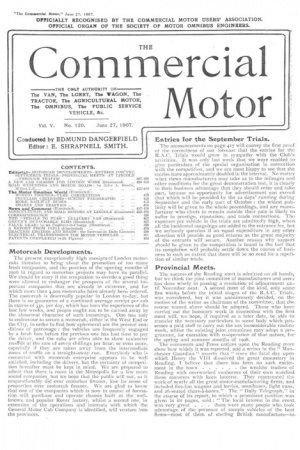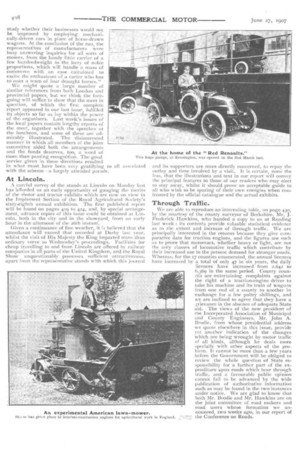Motorcab Developments.
Page 1

Page 2

If you've noticed an error in this article please click here to report it so we can fix it.
The present exceptionally high receipt5 of London motorcabs threaten to bring about the promotion of too many fresh companies, and the position of the opening months of 1906 in regard to motorbus projects may have its parallel. We should be sorry if the temptation to overdo a good thing were allowed to endanger the prospects of the several important companies that are already in existence, and for which more than 4,000 motorcabs have already been ordered. The motorcab is deservedly popular in London to-day, but there is no guarantee of a continued average receipt per cab in excess of 555. per day, which has been the experience of the last few weeks, and people ought not to be carried away by the abnormal character of such incomings. One has only to endeavour to secure a motorcab, either in the West End or the City, in order to find how ephemeral are the present conditions of patronage : the vehicles are frequently engaged by a fresh fare before the previous one has had time to pay the driver, and the cabs are often able to show taximeter reco'f-ds at the rate of seven shillings per hour, or even more, especially if they are taken away from the intermediate zones of traffic on a straight-away run. Everybody who is connected with motorcab enterprise appears to be well satisfied, including the drivers, but the certainty of competition hereafter must be kept in mind. We are prepared to admit that there is room in the Metropolis for a few more sound companies, hut we hope that the public will not, as it unquestionably did over motorbus finance, lose its sense of proportion over motorcab finance. We are glad to know that one of the companies which is now in course of formation will purchase and operate chassis built at the wellknown and popular Rover factory, whilst a second one, in extension of the operations and interests with which the General Motor Cab Company is identified, will venture into the provinces.
Entries for the September Trials.
The announcements on page 417 will convey the first proof of the correctness of our forecast that the entries for the R.A.C. Trials would grow in sympathy with the Club's activities. It was only last week that we were enabled to, give particulars of the special organisation in cOnnectioni with the competition, and we are most liappy to see that the entries have approximately doubled in the interval. No matter what views manufacturers may take as to the mileages arid other conditions for the great demonstration test, it is clearly to their business advantage that they should enter and take part, because no opportunity for advertisement can exceed that which will be provided by the 22 days' running during September and the early part of October : the widest publicity will be given to the whole proceedings, and any manufacturer who elects to remain outside their pale is likely to suffer in prestige, reputation, and trade connections. The
per vehicle in the trials are admittedly high, when all the incidental outgoings are added to the entrance fee, but. we seriously question if an equal expenditure in any other' direction will provide as good returns as the great majority: of the entrants will secure. Another reason why support: should be given to the competition is found in the fact that its completion will probably settle down the course of business to such an extent that there will be no need for a repeti tion of similar trials.
Provincial Meets.
The success of the Reading meet is admitted on all hands-) but we think the joint committee of manufacturers and useri, has done wisely in passing a resolution of adjournment un til. November next. A second meet of the kind, only some
five weeks before the initial stages of the R.A.C. Trials, was considered, hut it was unanimously decided, on the motion of the writer as chairman of the committee, that the course named above should be adopted. Those who have carried out the honorary work in connection with the first meet will, we hope, if required at a later date, be able to transfer the necessary particulars to some body which possesses a paid stag to carry out the not inconsiderable routine work, whilst the existing joint committee may adopt a programme, for execution with co-operation of that nature, for the spring and summer months of 1908.
The comments and Press notices upon the Reading meetshow how widely it was reported, and a writer in the " Manchester Guardian " asserts that " since the fatal day upon: which Henry the VIII dissolved the great monastery in Reading, I believe that there has been no such excite-. ment in the town the wealthy traders of Reading with overworked vanhorses of their own watched these monsters with keen interest. They represented the work of nearly all the great motor-manufacturing firms, and included five-ton wagons and lorries, omnibuses, light vans, and 26-seated chars-h-bancs." The " Daily Telegraph," in the course of its report, to which a prominent position was given in its pages, said " The local interest in the event was very great . . . there were many people who took advantage of the presence of sample vehicles of the best firms—most of them of sterling British manufacture—to, study whether their businesses would not be improved by employing mechanically-driven cars in place of horse-drawn wagons. At the conclusion of the run, the representatives of manufacturers were busy answering inquiries 'for all sorts of motors, from the handy little carrier of a few hundredweight to the lorry of noble proportions, which will handle a mass of commerce with an ease calculated to excite the enthusiasm of a carter who has to coax a team of four draught horses."
We might quote a large number of similar references from both London and provincial papers, but we think the foregoing will suffice to show that the meet in question, of which the first complete report appeared in our last issue, fulfilled its objects so far as lay within the power of the organisers. Last week's issues of the local papers contain lengthy reports of the meet, together with the speeches at the luncheon, and some of these are admirably illustrated, The disinterested manner in which all members of the joint committee aided both the arrangements and the funds deserves, too, a word of more than passing recognition. The good service given in these directions resulted in what must have been very gratifying to all with the scheme--a largely attended parade.
At Lincoln.
A careful survey of the stands at Lincoln on Monday last has "afforded us an early opportunity of gauging the merits of the motor and tractor exhibits which are now on view in the Implement Section of the Royal Agricultural Society's sixty-eighth annual exhibition. The first published report will be found on pages 419 to 424, and, by special arrangement, advance copies of this issue could be obtained at Lincoln, both in the city and in the showyard, from an early hour in the afternoon of the 26th instant.
Given a continuance of fine weather, it is believed that the attendance will exceed that recorded at Derby last year, whilst the visit of His Majesty the King imparted more than ordinary verve to Wednesday's proceedings. Facilities for cheap travelling to and from Lincoln are offered by railway companies in all parts of the United Kingdom, and the Royal Show unquestionably possesses sufficient attractiveness, apart from the representative stands with which this journal and its supporters are more directly concerned, to repay the outlay and time involved by a visit. It is certain, none the less, that the illustrations and text in our report will convey the principal features to those of our readers who may elect to stay away, whilst it should prove an acceptable guide to all who wish to be sparing of their own energies when confronted by the official catalogue and the actual exhibits.
Through Traffic.
We are able to reproduce an interesting table, on page 430, by the courtesy of the county surveyor of Berkshire, Mr. J. Frederick Hawkins, who handed a copy to us at Reading last week : its contents provide valuable statistical evidence as to the extent and increase of through traffic. We are principally interested in the returns because they give comparative data for traction engines, and the figures are such as to prove that motorcars, whether heavy or light, are not the only classes of locomotive traffic which contribute by their increased use to the present demand for stronger roads. Whereas, for the 17 counties enumerated, the annual licences have increased by a total of only 47 in six years, the daily licences have increased from 2,642 to 6,369 in the same period. County councils are entertaining complaints against the right of a traction-engine driver to Lake his machine and its train of wagons from one end of a county to another in exchange for a few paltry shillings, and we are inclined to agree that they have a 2,-rievance in the absence of adequate State aid. The views of the new president of the Incorporated Association of Municipal and County Engineers, Mr. John A. Brodie, from whose presidential address we quote elsewhere in this issue, provide yet another indication of the changes which are being wrought by motor traffic of all kinds, although he deals sire specially with other aspects of the problem. It cannot be more than a few years before the Government will be obliged to review the whole question of State responsibility for a further part of the expenditure upon roads which bear through traffic, and a favourable public opinion cannot fail to be advanced by the wide publication of authoritative information such as may be found in the two instances under notice, We are glad to know that both Mr. Brodie and Mr. Hawkins are on the joint committee of road makers and road users whose formation we announced, two weeks ago, in our report of the Conference on Roads.






























